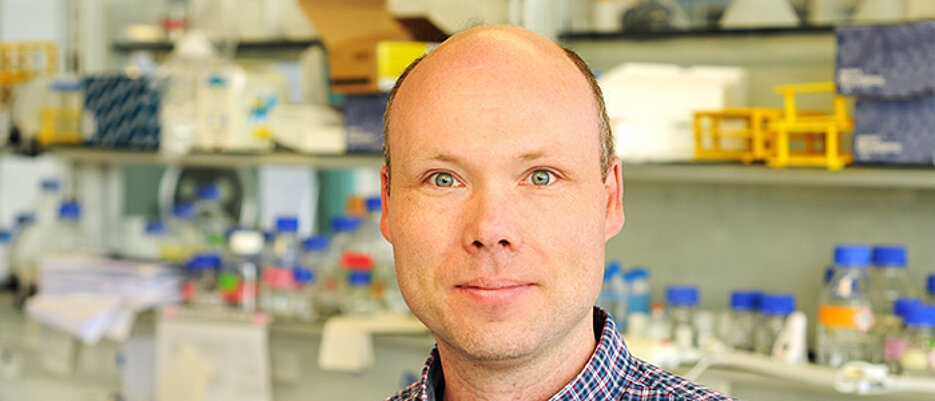Millions for cancer research
09/19/2017One specific gene is overexpressed in many human tumours. This particular gene is the centre of Elmar Wolf’s research activities. The European Research Council (ERC) has awarded him a "Starting Grant" worth €1.5 million for this purpose.
Elmar Wolf's research focuses on the so-called Myc proteins. These proteins are indispensable for the development and maintenance of healthy tissue. However, the also play a central role in causing a majority of human tumours. Wolf tries to find out more about these vital and at the same time dangerous proteins and is highly successful doing this.
An overdose in cancer cells
"We started from the observation that in a majority of all tumours, more Myc proteins are produced than in healthy cells," Elmar Wolf explains. So his research team first wanted to determine whether this "overdose" of Myc proteins in cancer cells works in the same way as Myc proteins in healthy cells.
It is generally known how Myc proteins function: Myc binds to the genetic material in the cell nucleus and selectively activates genes there. Elmar Wolf's research team first conducted a systematic study of which genes Myc activates in healthy cells and in cancer cells. Surprisingly, the researchers found that Myc activates totally different genes in cancer cells than in healthy ones.
Searching for new tumour therapies
"This observation electrified us: Previously, researchers had thought that Myc proteins cannot be used as targets in tumour therapy, because their function is very similar in healthy tissue and in cancer tissue. Now we know that Myc in cancer cells assumes wholly new functions. Hopefully, this will allow us to selectively target these oncogenic properties," Elmar Wolf says.
In his new project titled "Targeting the Oncogenic Function of Myc in vivo", the researcher wants to find out how a Myc-based tumour therapy can work. To do this, he has been granted €1.5 million from the European Research Council (ERC). "So far, we have mainly used biochemical methods to examine how Myc proteins work. The ERC Starting Grant will now allow us to harness this knowledge to develop new tumour therapies in animal models."
Vita
Elmar Wolf (37) studied human biology at the University of Marburg from 2000 to 2005. He submitted his doctoral thesis at the Max Planck Institute for Biophysical Chemistry in Göttingen in 2010. From July 2010 to 2015, Wolf did postdoc research at the University of Würzburg's Department for Biochemistry and Molecular Biology headed by Professor Martin Eilers. Since 2016, Wolf has been leading his own research group.
He has received multiple awards for his work. For example, in January 2016 the German Research Foundation (Deutsche Forschungsgemeinschaft - DFG) approved Wolf's application to set up an Emmy Noether Junior Research Group including research grants worth €1.2 million over five years.
And in May 2016, Wolf received the Röntgen Award which comes with a prize money of €5,000. Each year, the University of Würzburg and the Universitätsbund Würzburg present the award to recognize excellent junior researchers from Würzburg.
Contact
Dr. Elmar Wolf, Department of Biochemistry and Molecular Biology, Phone: +49 931 31-83259, elmar.wolf@biozentrum.uni-wuerzburg.de
ERC Starting Grants
The ERC Grants are the most prestigious European science awards and are annually presented to highly promising junior researchers in Europe by the European Research Council (ERC) after a rigorous selection process. The awards include a sum of money that allows the grantees to tackle complex projects.
The Starting Grants, which usually come with a prize money worth up to €1.5 million, target excellent early-career researchers who want to start their own career and set up their own research team.
This year, the ERC awards Starting Grants to 406 early-career scientists in Europe – 3,085 applications in total were submitted in this round. The funded scientists are of 48 nationalities and work in 23 European countries. With 67 awarded Starting Grants, Germany ranks second in the statistics behind the UK (79) and ahead of France (53). Overall, the ERC provides €605 million for this purpose.
Two starting grants for the University of Würzburg
This year, another Starting Grant went to the University of Würzburg: to Professor Georg Gasteiger, who has headed the Chair of Systems Immunology II at the University of Würzburg since June 2017. The ERC thereby finances Gasteiger's research project titled "Tissue-resident Lymphocytes: Development and Function in ‘real-life’ Contexts“ which we will present at a later time.










